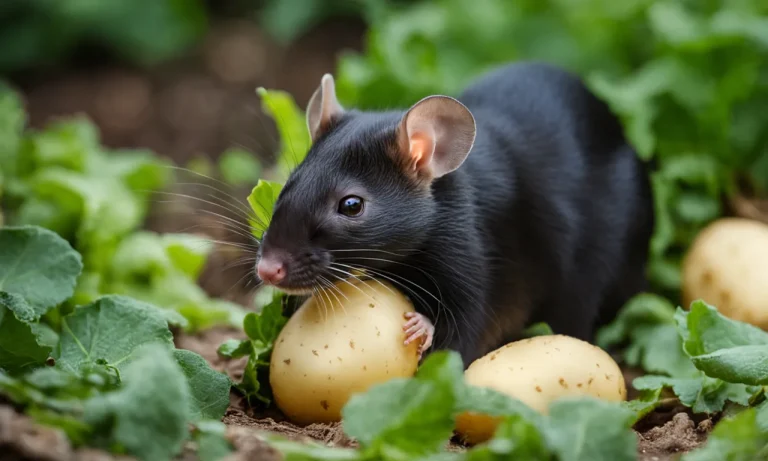If you have fruit trees in your yard, you may be wondering if their sweet bounty is attracting unwanted rats. It’s a common concern for homeowners and gardeners – but how valid is it? In this comprehensive guide, we’ll take an in-depth look at the connection between fruit trees and rats, and what you can do to discourage rodents from invading your property.
If you’re short on time, here’s a quick answer: Fruit trees can attract rats due to the sweet fruit they produce. However, with preventative measures like picking up fallen fruit, trimming branches, and using repellents, you can discourage rats from becoming a nuisance around your trees.
An Overview of Rats and What Attracts Them
Rats are common pests that can cause significant damage to fruit trees. Understanding why rats are drawn to fruit trees and how to prevent infestations is crucial for any fruit tree owner. Rats are attracted to fruit trees because they provide a reliable source of food, water, and shelter.
They are particularly drawn to the fruit itself, as it provides a rich and easily accessible food source. Rats are opportunistic feeders and will take advantage of any available food, including fallen fruit or fruit that is not properly harvested.
Additionally, the foliage and branches of fruit trees provide rats with shelter and nesting sites.
Why Rats Are Drawn to Fruit Trees
Rats are attracted to fruit trees for several reasons:
- Food source: Rats are drawn to the abundance of fruit that fruit trees produce. The sweet and juicy fruits are irresistible to these pests.
- Water: Fruit trees often require regular watering, which can create a water source that attracts rats. Rats need water to survive, and fruit trees provide a convenient and accessible supply.
- Shelter: The dense foliage and branches of fruit trees provide rats with ample hiding spots and nesting sites. Rats can easily hide within the tree’s canopy, making it difficult to detect and remove them.
Common Rat Species That Infest Fruit Trees
Several rat species are known to infest fruit trees:
| Rat Species | Description |
|---|---|
| Norway Rat | The Norway rat, also known as the brown rat, is one of the most common rat species that infest fruit trees. They are excellent climbers and can easily access the fruit and foliage. |
| Roof Rat | Roof rats are another common rat species that can be found in fruit trees. They are agile climbers and are known for their ability to infest attics and roofs, hence their name. |
When Rats Are Most Active Around Fruit Trees
Rats are primarily nocturnal creatures, which means they are most active during the night. However, they can also be active during the early morning and dusk. These are the times when fruit trees are most vulnerable to rat infestations.
Rats are more likely to be active when there is less human activity and when it is dark and quiet.
It is important for fruit tree owners to be aware of these active periods and take appropriate measures to prevent rat infestations. Regularly inspecting the trees for signs of rats, such as droppings or gnaw marks, and implementing effective pest control strategies can help protect fruit trees from these destructive pests.
Do All Fruit Trees Attract Rats?
While it is true that rats are often attracted to fruit trees, not all fruit trees are equally appealing to them. There are certain factors that can influence the likelihood of rats being attracted to a particular fruit tree.
Understanding these factors can help you make informed decisions when planting fruit trees in your garden.
Trees That Are Prone to Rats
Some fruit trees are more attractive to rats due to their fruit characteristics and the availability of shelter. Citrus trees, such as orange and lemon trees, are known to be particularly appealing to rats.
These trees produce fruits that are high in sugar content, making them irresistible to rodents. Additionally, citrus trees often provide ample shelter in the form of dense foliage, creating an ideal hiding place for rats.
Other fruit trees that are prone to attracting rats include fig trees and avocado trees. Rats are drawn to the sweet, juicy figs produced by fig trees. Avocado trees, on the other hand, provide rats with a consistent food source throughout the year, as avocados tend to ripen at different times.
Trees That Are Less Prone to Rats
While some fruit trees are more likely to attract rats, there are also trees that are less appealing to these rodents. Apple trees, for example, are generally less attractive to rats compared to citrus trees. The acidity of apples may deter rats from consuming the fruit.
Similarly, peach and plum trees are not as prone to rat infestations.
In general, fruit trees with smaller fruits and less sugary content are less likely to attract rats. Trees such as cherry, pear, and apricot are known to be less attractive to rats due to their fruit characteristics.
Fruit Characteristics That Attract Rats
When it comes to fruit characteristics that attract rats, sweetness and ripeness play a significant role. Rats are attracted to fruits that are rich in sugar and have reached an optimal level of ripeness.
Fruits that are overripe and starting to decay are particularly appealing to rats, as they are softer and easier to consume.
It’s important to note that while certain fruit characteristics are attractive to rats, the presence of rats does not necessarily mean that the fruit is unhygienic or inedible. Rats are opportunistic feeders and will consume a wide range of food sources if available.
For more information on how to prevent rat infestations in your garden, you can visit www.pestworld.org, a website dedicated to providing resources and guidance on pest control.
Managing and Deterring Rats in Fruit Trees
Having fruit trees in your garden can be a delightful addition, providing you with fresh and delicious fruit throughout the year. However, one concern that many gardeners have is whether fruit trees attract rats.
While it is true that rats are attracted to food sources, there are several effective ways to manage and deter these unwanted pests from your fruit trees.
Picking Up Fallen Fruit
One of the most important steps in managing rats in fruit trees is to regularly pick up fallen fruit from the ground. Rats are attracted to the scent and taste of ripe fruit, so by promptly removing fallen fruit, you can eliminate a potential food source for them.
Additionally, by keeping the ground clear, you are reducing the chances of rats nesting or hiding in the area.
Trimming Back Branches
Another way to deter rats from accessing your fruit trees is to trim back branches that may be providing them with easy access. Rats are excellent climbers and can use overhanging branches to reach the fruit.
By trimming back these branches, you are creating a physical barrier that makes it more difficult for rats to reach the fruit.
Using Physical Barriers
Physical barriers can also be an effective method of keeping rats away from your fruit trees. Installing wire mesh or tree guards around the trunk can prevent rats from climbing up. Additionally, wrapping individual fruits or clusters of fruits with paper or mesh bags can protect them from being eaten by rats.
Employing Natural Rodent Repellents
There are several natural repellents that can help deter rats from your fruit trees. Peppermint oil, for example, has been found to be effective in repelling rodents. By spraying a diluted solution of peppermint oil around the base of your fruit trees, you can create an unpleasant scent that rats will avoid.
Similarly, planting mint or other strong-smelling herbs near your fruit trees can have a similar effect.
Setting Rodent Traps
If you have a persistent rat problem, setting rodent traps can be an effective solution. There are various types of traps available, including snap traps, live traps, and electronic traps. It is important to place traps in areas where rats are likely to frequent, such as along fence lines or near their nesting sites.
Regularly check the traps and dispose of any captured rats safely and responsibly.
Keeping Dogs On Your Property
Having a dog on your property can also help deter rats from your fruit trees. Dogs are natural predators of rats and their presence alone can be enough to keep rats away. The scent of a dog can act as a deterrent, making rats think twice before venturing near your fruit trees.
Planting Non-Fruiting Trees and Shrubs
In addition to managing rats directly, planting non-fruiting trees and shrubs around your fruit trees can also help. Rats are less likely to be attracted to an area if there are no food sources available.
By diversifying your garden with a variety of plants, you can create a less appealing environment for rats.
Remember, prevention is key when it comes to managing rats in fruit trees. By implementing these strategies and staying vigilant, you can enjoy your fruit trees without the worry of attracting unwanted pests.
When to Call An Exterminator for a Rat Infestation
Rat infestations can be a serious problem, and it is important to take action as soon as you notice a problem. While there are DIY methods for dealing with rats, sometimes the situation calls for professional help.
Here are some signs that indicate it’s time to call an exterminator for a rat infestation:
Signs You Have a Severe Rat Problem
If you’ve noticed multiple signs of rats in your home or property, it’s likely that you have a severe rat problem. Some common signs include:
- Visible rat droppings
- Gnawed holes in walls or furniture
- Chewed electrical wires
- Strange noises coming from walls or ceilings
- Unpleasant odors
If you have noticed any of these signs, it is important to act quickly to prevent further damage and potential health risks.
Why Exterminators Are Equipped For Severe Infestations
Exterminators are trained professionals who have the knowledge, experience, and tools necessary to effectively deal with severe rat infestations. They understand the behavior and habits of rats, allowing them to develop a targeted approach to eradicate the problem.
Exterminators are equipped with specialized equipment and products that are not readily available to the general public. They can safely and effectively apply treatments to eliminate rats and prevent future infestations.
Additionally, exterminators have access to professional-grade traps and baits that are more effective than those found in stores.
By hiring an exterminator, you can have peace of mind knowing that you are dealing with the problem in the most efficient and effective way possible.
Extermination Methods They May Use
Exterminators have a range of methods at their disposal to deal with rat infestations. The specific methods used will depend on the severity of the infestation and the preferences of the homeowner. Some common extermination methods include:
- Trapping: Exterminators may use traps to capture rats alive or kill them instantly.
- Baiting: Exterminators often use specially formulated baits that are attractive to rats but safe for humans and pets.
- Sealing Entry Points: Exterminators will identify and seal off any entry points that rats may be using to access your property.
- Sanitation Measures: Exterminators may recommend sanitation measures to eliminate potential food and water sources for rats.
It’s important to note that exterminators prioritize humane and environmentally-friendly methods whenever possible. They will work with you to develop a customized plan that meets your specific needs while minimizing harm to the rats and the surrounding environment.
If you are experiencing a severe rat infestation, it is highly recommended to contact a professional exterminator. They have the expertise and resources to effectively eliminate the problem and help you regain control of your home.
Conclusion
While fruit trees can attract rats to your yard, there are many preventative measures you can take to deter them. With vigilance, cleanup, and exclusion tactics, you can reap the bounty of your trees without surrendering the harvest to rodents.
However, if the rat problem becomes unmanageable, don’t hesitate to call in professional pest control reinforcements. With their advanced techniques and expertise, they can eliminate large-scale infestations and allow you to once again enjoy your backyard paradise.






